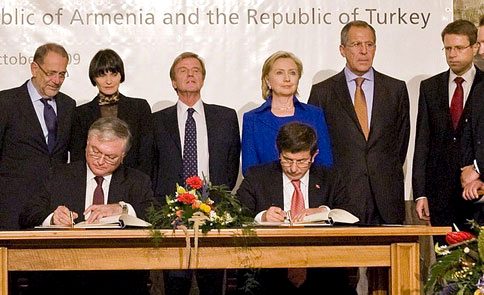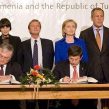
Turkish-Armenian Deal Threatens To Unravel
Publication: Eurasia Daily Monitor Volume: 7 Issue: 18
By:

Armenia and Turkey have moved to the brink of reversing a universally welcomed thaw in their relations, with differing interpretations of a landmark fence-mending agreement signed in October 2009. Yerevan is threatening to annul the two “protocols” over Ankara’s continuing linkage between their implementation and the resolution of the Karabakh conflict. The Turkish government has responded by denouncing the interpretation of their implications made by Armenia’s constitutional court this month.
The increasingly real prospect of the deal’s collapse is creating a serious headache for the United States, which has actively encouraged and at times mediated in the Turkish-Armenian rapprochement. Successive US administrations have viewed the normalization of relations between the two estranged nations as a major US foreign policy objective in the region.
The signing of the protocols in Zurich in the presence of US Secretary of State Hillary Clinton and senior diplomats from Russia and the European Union was the culmination of a largely confidential dialogue, which began shortly after the current Armenian president, Serzh Sargsyan, took office in April 2008. The documents commit Turkey to establish diplomatic relations and re-open its border with Armenia, which it closed in 1993 out of solidarity with Azerbaijan. Nationalist groups in both countries condemned the deal as a sellout, with Sargsyan facing particularly harsh domestic criticism. His detractors in Armenia and its worldwide diaspora have condemned the Yerevan government for agreeing to the creation of a Turkish-Armenian inter-governmental “sub-commission” that would study the 1915-1918 mass killings and deportations of Armenians in the Ottoman Empire. They say Ankara would exploit that study to keep more countries from officially recognizing the massacres as genocide. Some of them are also furious with another protocol clause that obligates Armenia to explicitly recognize its existing frontier with Turkey.
Turkish leaders have repeatedly stated in recent months that Turkey’s parliament will not approve the protocols without a Karabakh settlement that would satisfy Azerbaijan. Prime Minister Recep Tayyip Erdogan reaffirmed that linkage after his December 7, 2009 talks in Washington with US President Barack Obama (Today’s Zaman, December 8). Three days later, Sargsyan publicly threatened to walk away from the deal, unless Ankara ensured its unconditional parliamentary ratification “within a reasonable timeframe.” The Armenian leader reiterated Yerevan’s arguments that neither protocol makes any reference to the Karabakh dispute (Aravot, December 11).
Underscoring the seriousness of the situation, Clinton telephoned Sargsyan later on December 10. A statement by the Armenian presidential press service said she briefed him on Obama’s talks with Erdogan and reaffirmed Washington’s unwavering support for a “speedy normalization of relations between Armenia and Turkey without preconditions.” However, Clinton’s intervention did not prevent an escalation of Turkish-Armenian tensions (Aravot, December 11).
On January 12, the Armenian constitutional court certified the legality of the protocols in a ruling that paved the way for their discussion and ratification by the Armenian parliament. Attached to that judgment was a six-page interpretation of the protocols’ implications, clearly intended to placate Armenian critics of the deal. The court said that the mutual obligations undertaken by Ankara and Yerevan “are exclusively of a bilateral nature, and cannot concern … any third party or the relations with such third party of the signatories of the protocols.” It thus implied that the Turkish-Armenian agreements cannot have any bearing on the Armenian-Azerbaijani conflict. The ruling, posted on the court’s website (www.concourt.am), also made clear that the agreements cannot override a 1990 Armenian declaration of independence, which stated that the South Caucasus state will seek the “international recognition of the Armenian genocide of 1915 committed in Ottoman Turkey and Western Armenia.”
The Turkish foreign ministry released a statement on January 18 accusing Yerevan of setting “unacceptable” preconditions that undermine “the very reason for negotiating these protocols as well as their fundamental objective.” Erdogan issued a similar warning two days later, saying that the normalization process will be at serious risk if the Armenian court ruling is not “corrected” (Anatolia news agency, January 20). Armenian officials brushed aside these claims. They argued that the court simply echoed statements on the subject which had for months been made by Sargsyan and other Armenian leaders and had prompted no reaction from Ankara.
In a January 20 phone call with his Turkish counterpart Ahmet Davutoglu, Armenian Foreign Minister Edward Nalbandian warned Ankara against looking for “artificial excuses” to avoid normalizing bilateral ties. He also said the protocol ratification process has made no progress in Turkey since October (Statement by the Armenian Foreign Ministry, January 20). Davutoglu rejected the claim as “baseless” (Hurriyet Daily News, January 21).
The bitter exchange only increased the likelihood of a collapse of the normalization process. Armenia has made clear that its parliament, in which it Sargsyan has a comfortable majority, would ratify the protocols only after their parliamentary endorsement in Turkey. Yerevan is understood to have given Ankara until late March to validate the deal or face its unilateral abrogation by Armenia. The unofficial deadline is directly connected with April 24 annual remembrance of over one million Ottoman Armenians massacred in what many historians consider as genocide.
Obama refrained from using the word “genocide” in his April 2009 statement, citing the need to avoid undermining the ongoing Turkish-Armenian dialogue. Sargsyan will be anxious to fend off Armenian opposition claims that he is again helping the US president renege on a key campaign pledge given to the influential Armenian-American community, without gaining any tangible benefits from the reconciliation process. The Armenian leadership seems convinced that the US, European Union and Russia, which have all called for an unconditional implementation of the Turkish-Armenian agreements, will regard Turkey as the recalcitrant party should that process end in failure. Nalbandian spoke of a “win-win situation” for Yerevan in a January 17 interview with Radio Free Europe. Armenia, he said, will at least “not lose anything that we had before this process.”
The Armenian government will only be buoyed by what appears to be US endorsement of its position on the controversy surrounding the court ruling. Philip Gordon, the US Assistant Secretary of State for European and Eurasian affairs, stated on January 22 that Washington regards the ruling a “positive step forward in the ratification process of the normalization protocols” and believes it “does not appear to limit or qualify them in any way” (www.armenialiberty.org, January 22). Whether the Obama administration will welcome a unilateral Armenian repeal of the agreements is a different question.




